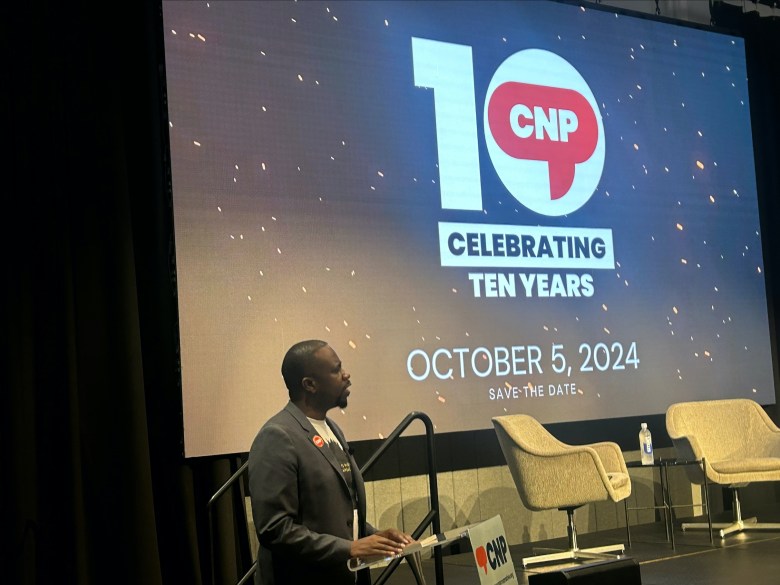James Baldwin & Atlanta: A community discussion

The joy and camaraderie that filled The Gathering Spot on August 2 echoed the sentiments that author and activist James Baldwin often preached in his writing.
On that day many gathered to celebrate the 100th birthday of this legendary and historical writer. “James Baldwin & Atlanta,” a community discussion produced by The Counter Narrative Project (CNP), featured Charles Stephens and Kimberly Latrice Jones speaking about Baldwin’s enduring influence and the current socio-political landscape of Atlanta. The discussion, moderated by Stephens, explored Baldwin’s impact and the evolving challenges faced by communities of color today.
Charles Stephens, founder and executive director of CNP, found a deep connection to Baldwin’s work even as a young boy. “My presence here today has everything to do with James Baldwin,” Stephens shared. “He saw me when I was a little boy trying to figure everything out. His words gave me the courage to become a leader,” Stephens continued.
Stephens recounted discovering Baldwin’s work as a young boy and how it inspired him to establish CNP as a tribute to Baldwin’s legacy. Stephens cited CNP as becoming a national leader in racial justice and HIV advocacy. “I wanted to create an organization that would serve as a tribute to James Baldwin,” Stephens explained. “Baldwin’s relationship with Atlanta was not as visible as it should be, and that’s why this program was created,” Stephens shared.

Kimberly Latrice Jones, a New York Times bestselling author and activist, discussed her admiration for Baldwin and his impact on her work. “Baldwin is one of my greatest influences,” Jones stated. “His voice, along with Toni Morrison’s, represents the pinnacle of creating unapologetic Black narratives.”
Jones shared her experience of contributing a blurb for the book “The Evidence of Things Not Seen”, highlighting the intersection of her work with Baldwin’s legacy. “I was recording my audiobook next to Stacey Abrams, and the publishers realized this was the perfect opportunity for a collaboration,” she recalled. “It was a moment of serendipity that connected me to Baldwin’s work in a profound way.”
Both Stephens and Jones explored Baldwin’s perspective on Atlanta’s current socio-political climate. Stephens noted Baldwin’s critical view of Atlanta’s self-perception versus reality. “Baldwin would see through the illusion that Atlanta is different from the rest of Georgia,” Stephens suggested. “Despite the city’s reputation as progressive, the policies and practices often reflect a broader, more troubling reality.”
Jones echoed this sentiment, pointing out that Baldwin would likely critique the commercialization and superficial progressiveness of the city. “Baldwin would recognize that while Atlanta markets itself as a haven for the queer community, the policies and systemic issues remain largely unchanged,” Jones asserted. “The same superficial inclusivity masks the underlying issues of white supremacy and class disparity.”
The discussion also touched upon the impact of book bans, particularly on marginalized voices. Stephens highlighted the local nature of these bans and their broader implications. “Book bans are not just a federal issue; they’re happening at the local level, affecting our communities directly,” Stephens noted. Currently, “The Fire Next Time” is Baldwin’s only listed banned book in the state of Georgia, specifically in Clay County School District.
Jones, a Smith Young talent client under their literature and speaker department, shared her insights on how book bans disproportionately target works by authors of color and queer writers, “The quickest way to mobilize against book bans is to target Black, brown, and Indigenous authors first,” Jones explained. “These bans reflect a broader attempt to silence and marginalize these voices,” Jones explained.



